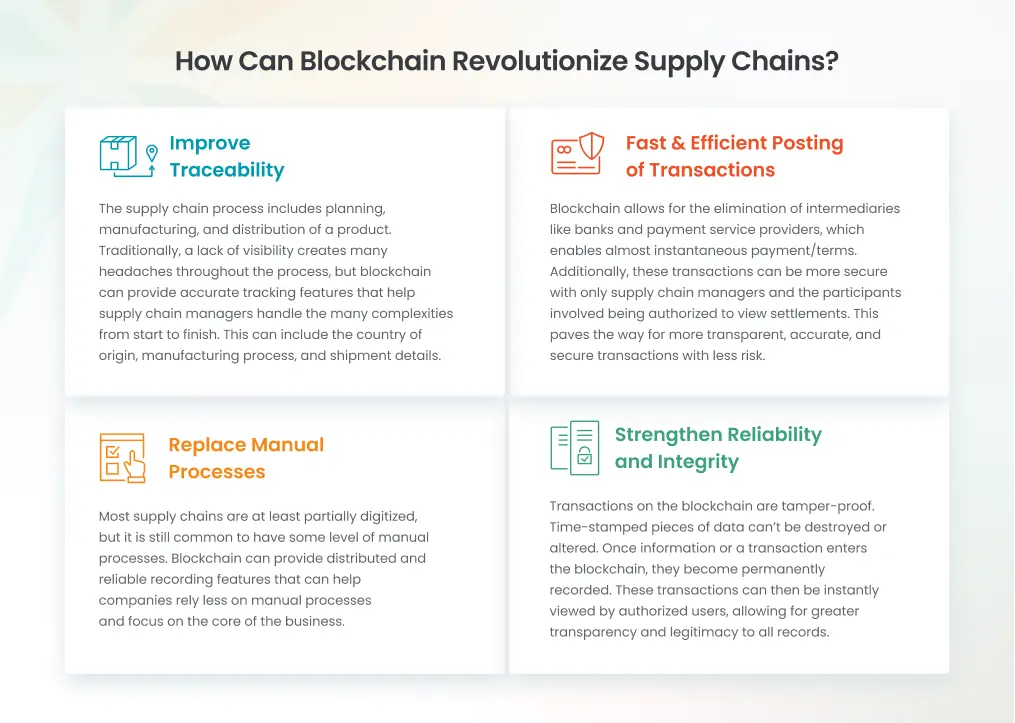
As supply chains continue to grow more complicated and complex, customers and regulators are seeking transparency up the chain. Blockchain technology is positioned to become the solution to provide this benefit, along with many others. Centered around the visibility and availability of specific data, blockchain technology can help supply chain leaders build and retain supply chain resiliency moving into the future.
Transparency is the name of the game in the supply chain world. Customers are demanding honesty, openness, and accountability about where products are coming from, while companies are trying to manage complex supply chain systems, control costs, and minimize errors. Blockchain has emerged as a solution to untangle data, manage documents and contracts, and handle communication exchanges within the supply chain ecosystem.
What is Blockchain?
Blockchain is a cloud-based digital ledger and record of information, where transactions are recorded and distributed across networks of computer systems. Essentially it is a type of Distributed Ledger Technology (DLT), that acts as a decentralized database managed by multiple participants. It records items in a chain of secure “blocks,” which allows different partners to upload information at any time, and the blockchain saves/retains all copies. This allows the blockchain to show real-time information and chronological changes to any item – simply becoming a single point of all shared information.
What are the Benefits of Blockchain?
There are numerous benefits to blockchain including:
Secure – Transactions are logged in blocks and all of them are individually encrypted.
Distributed – Each participant can access and has a copy of the ledger as it works like a digital record that is accessible to a network of individuals.
Programmable – Gives you the capability to create and run applications, like smart contracts.
Time-Stamped – Every transaction recorded on a block is timestamped, paving the way for even more transparency.
Immutable – Blockchain technology was designed for robust security features, and validated records can no longer be altered or reversed.

The powerful features of blockchain technology are now reaching many industries, some of which are known to have the most complex supply chains, regulatory actions, and need for transparency. Healthcare/Pharmaceuticals, Banking/Finance, Food/Farming, Tourism, Oil, Fashion, and Jewelry are just a few industries ripe for disruption with the application of blockchain technology.
Food Supply Chain: In the food industry, partnerships can be made with the growers, suppliers, processors, distributors, and retailers to tie the whole supply chain together and to drive more efficient operations and tracking, end to end.. Increased transparency and efficiency in the food supply chain can help track and trace food epidemics and help save inventory, where now much or all of it is scrapped. Walmart, IMB, JD.com, and Tsinghua University have partnered to research and maintain the blockchain tech and manage the shipping and manufacturing processes. As this project progresses, other large corporations such as Nestle, Unilever and Tyson Foods are expected to participate in the joint venture. Other ventures have been able to use QR codes to stop illegal wine production by placing QR codes on bottles that allow shoppers to scan the code and receive all supply information about their purchase. These programs are just the beginning of what could become a very transparent way for customers to have all product information for any item at the click of a button.
Diamonds and Jewels Supply Chain: The diamond industry has many problems, especially relating to the working conditions. In many cases, diamonds are mined under dangerous or inhumane conditions and can be used to finance many disputes in the main regions of mining, namely Africa. The world’s largest diamond producer, De Beers, want to end this cycle with a blockchain supply chain program called “Tracr.” In this program, participants upload photos and information about the color, quality, and location of cut diamonds. The program aims to bring transparency to the diamond industry and help prevent illegal mining activities across the globe. Brilliant Earth, a jewelry company, is following this lead by using blockchain to track, trace the origin, and ensure legitimacy of their diamonds, gemstones, and precious metals. As customers become more aware of, and concerned about the origins of their purchases, companies that incorporate blockchain into their supply chains can create competitive advantage.
Every indication is that blockchain is poised to be a game changer in supply chain. Early adopters of this technology are using it to: manage and track their assets, regulate and audit their supply, track sales, improve processes through smart contracts, accept cryptocurrency as payments, and boost their digital identity. Blockchain is still in its nascent form but is poised to revolutionize supply chain management. In the coming years, it is expected to expand at a rapid pace, but transformation takes time in such well-established industries and processes. With the addition of robotics, automation, and machine learning, blockchain can become the default technology in supply chains and unleash its true potential as a game changer in the industry.
Want to hear more of Arroyo Strategy’s predictions and suggestions for leveraging blockchain in your procurement organization? Please check out our recent webinar covering the basics of blockchain, smart contracts, procure to pay benefits and supply chain benefits/use cases here: Access our Webinar.
Sources:
“4 Ways Blockchain Is Revolutionizing Supply Chain!” Supply Chain Game Changer, 5 Dec. 2021, https://supplychaingamechanger.com/4-ways-blockchain-is-revolutionizing-supply-chain/.
“Blockchain for Supply Chain Solutions.” IBM, IBM Corporation, 22 Oct. 2020, https://www.ibm.com/blockchain/supply-chain.
Galarza, Robert. “Blockchain’s Critical Role in Supply-Chain Transparency.” SupplyChainBrain, Keller International Publishing Corp, 22 Dec. 2020, https://www.supplychainbrain.com/blogs/1-think-tank/post/32329-blockchains-critical-role-in-supply-chain-transparency.
Gaur, Vishal, and Abhinav Gaiha. “Building a Transparent Supply Chain: Blockchain Can Enhance Trust, Efficiency, and Speed.” Harvard Business Review, Harvard Business Review, 14 Apr. 2020, https://hbr.org/2020/05/building-a-transparent-supply-chain.
“IBM Supply Chain Intelligence Suite – Blockchain Transparent Supply.” IBM, IBM Corporation, https://www.ibm.com/blockchain/solutions/transparent-supply.
Infopulse. “Blockchain in Supply Chain Management: Key Use Cases and Benefits.” Medium, Medium, 7 Oct. 2019, https://medium.com/@infopulseglobal_9037/blockchain-in-supply-chain-management-key-use-cases-and-benefits-6c6b7fd43094.
inVerita. “How Blockchain Is Redefining Supply Chain Management.” Medium, Medium, 6 Apr. 2021, https://medium.com/@inverita/how-blockchain-is-redefining-supply-chain-management-d8caef5e0ebd.
“The Next Great Leap in Supply Chain Transparency: Blockchain!” Supply Chain Game Changer™, 8 Nov. 2021, https://supplychaingamechanger.com/blockchain-the-next-great-leap-in-supply-chain-transparency/.
Operations Management Podcasts Strategic Management Global FocusNorth America. “How Blockchain Will Redefine Supply Chain Management.” Knowledge@Wharton, Wharton School of the University of Pennsylvania, 30 July 2019, https://knowledge.wharton.upenn.edu/article/blockchain-supply-chain-management/.
Sharma, Sachin. “5 Examples Of Blockchain In Supply Chain Management.” Oyelabs, 7 Dec. 2021, https://oyelabs.com/examples-of-blockchain-in-supply-chain-management/.
“What Are the Advantages of Blockchain for Your Supply Chain?” Redwood Logistics, 4 Jan. 2018, https://www.redwoodlogistics.com/advantages-blockchain-supply-chain/.


